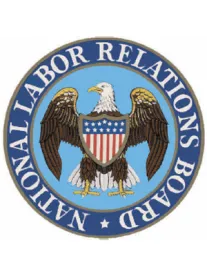A recent National Labor Relations Board (“NLRB”) decision by an Administrative Law Judge (“ALJ”) found numerous violations of the National Labor Relations Act (the “Act”) stemming from the reaction of a mortgage brokerage firm to a conversation in which one of its bankers used profanity and complained about a client in an office restroom. While this decision may seem extreme to some, it is also an example of the expansive view that the NLRB is taking in deciding what types of employee communication and activities, particularly with respect to non-unionized workforces, will be found to be protected by the Act as “concerted activity” relating to employees’ terms and conditions of employment.
A brief overview of the facts is worth reciting to shed light on the decision. Quicken Loans, Inc. and Austin Laff, an Individual, Case Number 28-CA-146517, centered around Austin Laff, a mortgage banker, who had a conversation with a co-worker, another mortgage banker, in a workplace restroom near the company reception area. While the precise content of the conversation was in dispute, Laff claimed that he asked the other banker how it was going and that this banker then complained about a new client that “should get in touch with a [f-ing] Client Care Specialist and quit wasting his [f-ing] time.” A supervisor who overheard the conversation thereafter sent an email to all employees in the Company’s Arizona’s office stating, “Under no circumstances should we be discussing the pay we receive, in an area that a client or potential client could ever hear us. . . . Never, EVER should we be swearing in the bathroom especially about clients.” When Laff was later questioned by another supervisor about the restroom conversation, he claimed “that he had no clue” about the incident. Given his complete denial, Laff was given separation documents and terminated. After the termination, Laff claimed he was party to the conversation but it was his co-worker who made the alleged comments. The Company then issued a disciplinary warning to the co-worker for making the comments.
Laff filed an unfair labor practice charge with the NLRB, claiming he had been terminated for engaging in actions protected by the Act. Following an investigation, the Board’s Regional Director issued a complaint and the matter was referred to a hearing before an ALJ to determine the facts and assess whether the employer had violated the Act. Notably, in cases such as this, where there are disputed facts, the NLRB will refer the cases for hearing.
After a 3 day trial, the ALJ found multiple violations of the Act. We highlight a few of these findings as they reflect the expansive definition that the NLRB is applying to protected concerted activity in recent times:
-
Laff and His Co-worker Engaged in Concerted Protected Activity. Section 7 of the Act, in pertinent part, states: “Employees shall have the right to self-organization to form, join, or assist labor organizations, to bargain collectively through representatives of their own choosing and to engage in other concerted activities for the purpose of collective bargaining or other mutual aid and protection.” Finding that Laff and his co-worker were discussing “common concerns regarding terms and conditions of their employment,” including how calls are forwarded and whose responsibility it was to field calls with the goal of improving terms and conditions of employment, the ALJ concluded that their discussions were concerted protected activity. The fact that their conversation was arguably only preliminary (i.e., one that only laid the groundwork for possible further group activity) did not change the conclusion.
-
The Termination of Laff and Discipline of the Co-worker Violated the Act. Given that Laff and the co-worker were engaged in concerted protected activity that formed the basis of their alleged misconduct, the ALJ determined that the discharge and warning violated the Act. The ALJ rejected the Company’s assertion that it would have disciplined the co-worker in the absence of the protected activities due to his profanity because there was evidence of regular and tolerated use of profanity in the workplace.
-
The Email to Employees About Appropriate Language Constituted Unlawful Rules. A work rule violates Section 8(a)(1) of the Act if it “would reasonably chill employees in the exercise of their statutory rights.” The ALJ found that the email sent by the supervisor contained rules that were unlawful on their face because they specifically prohibited employees from discussing their terms and conditions of employment and their pay, even though the restriction of such discussions may actually have been intended to be limited to instances in which clients or potential clients could overhear based on the ALJ’s view that anyone could be a “potential client.” Likewise, the ALJ found that the rule, “Never, EVER should we be swearing in the bathroom, especially about clients,” and the prohibition against stating “that clients that call in are wasting your [expletive] time” also violated the Act because they were promulgated in direct response to Section 7 concerted and protected activity.
-
Laff Was Unlawfully Interrogated. Questioning by an employer regarding the employees’ own concerted protected activity or that of other employees is unlawful under the Act if it would reasonably have a tendency to interfere with, restrain or coerce employees in the exercise of their Section 7 rights. The supervisor’s questioning of Laff was found to be improper because rather than ask whether he had engaged in any specific misconduct, he was asked whether he saw the office-wide email and if “he had any part in the situation that went down.” This questioning was considered to be coercive and to violate Section 8(a)(1).
-
Standard Separation Documents Provided to Laff Violated the Act. In addition to finding the confidentiality provision of the separation agreement improperly overbroad, the ALJ found that the agreement’s fairly standard obligation to return all company property was overly broad because it restricted employees from providing items like employee handbooks to government agencies and private counsel. Additionally, the ALJ determined that the agreement’s non-solicitation provision restricting employees from contacting or soliciting the Company’s employees or clients “for any reason” was overly broad and unlawful. Citing a 2013 decision that also involved Quicken Loans, the ALJ stated that employees are allowed to criticize their employer and its products under Section 7, and sometimes they do so in appealing to the public or to their fellow employees in order to gain support.
This case demonstrates the current broad view of the NLRB as to what constitutes a “concerted protected activity,” interrogation, “work rules” and unlawful activity under the Act. In light of this, employers subject to the Act (essentially employers whose companies affect commerce) should be mindful that disciplining or terminating employees who may be engaged in concerted activities (such as complaining about clients) may run afoul of Section 8 of the Act. Employers also should look at their various agreements (handbooks, offer letters, manuals, separation agreements, etc.) to ensure that they do not require employees to keep secret “all” proprietary/confidential information, prohibit employees from soliciting employees or clients “for any reason,” or require employees to return “all” company property. Such requirements may be deemed overly broad and unlawful. Finally, managers should be cautioned about sending emails or communicating other broad requirements that could be deemed overbroad work rules.




 />i
/>i

